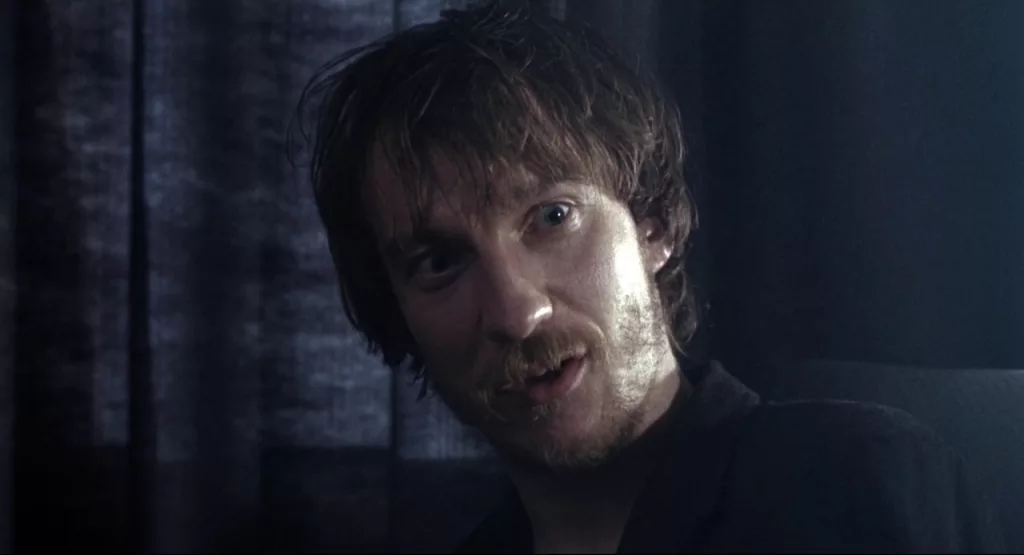United Kingdom, 1993
Directed by Mike Leigh
With: David Thewlis (Johnny), Lesley Sharp (Louise), Katrin Cartlidge (Sophie), Greg Cruttwell (Jeremy), Claire Skinner (Sandra)

The final images show the lead character running away, his lanky body limping badly, his face bruised and with a black eye. He has his usual stubborn and forbidding looks but there is now a faint smile on his lips. And for the first time in this thoroughly bleak movie, the sun breaks the clouds. Alone, awkward, and yet somehow radiant, Johnny is on the move again.
The plot of his story is minima. He has left in a rush Manchester to go and find his former girlfriend Louise in London; he meets her and her roommate Sophie, but cannot stay in their place; he flees to walk in a desultory, desperate manner through the streets of the big, dire city, meeting other lonely people before a band of teenagers kick him; he then crawls back to Louise, his wounds are tended by Sandra, Louise’s other roommate but as usual nothing can be fine; so then come those final images.
There is not much action but there is much talking. Johnny is bent on asking pointed questions, making caustic witticism, and expounding philosophical ideas. He is quite persistent, even nagging, and his gift of the gab is as riveting as it is annoying. His language quietly mixes sophistication with profanity. He likes his utterances to be prophetic and truly enjoys the moment when he becomes an irritant. He is the first to quiz, stunning folks. Only a gruff night watchman would rival his loquacity; other characters, who are mainly women, are more tentative as they search their words, save for Louise who can retort in a no-nonsense and mordant way. The dazzlingly garrulous Johnny gives the movie both an intellectual edge and an overriding sense of corrosive, black. Funny lines go hand in glove with dour statements in the text written by director Mike Leigh after many discussions and rehearsals with the actors, according to his idiosyncratic, collaborative, truly creative methods.
The only action really interesting to Johnny and others, and which is regularly shot, is sex. In fact, he fled Manchester because he made love to a woman against her desire, a shocking scene of non-consensual sex that is the film’s first sequence, in a bold and telling move from the director. His first encounter with Sophie ends up in bed. He never hides the fact he has a vigorous libido. And clearly some women need sex to get on, like the lone women in a flat he and the watchman noticed.
The film introduces later another lonely man with a strong sexual appetite, an upper-class, self-conscious, and callous snob who turns out to be Louise’s landlord. But while sharing comparable lust and domineering behavior towards ladies, Jeremy is Johnny’s polar opposite. Pleasure plays not part in his sense of entitlement and sentiments are readily discounted. The landlord is the depressing foil to the provocative thinker-turned-tramp, the film exploring through the contrast the perennial fault lines running across the acutely, hopelessly, class-conscious and class-divided England.
Johnny relishes symbols and revelations (especially the Revelation) but doe not disclose much about him. Characters here are a given and no attempt to explain them is made. Their shortcomings and deep flaws do not make it easy to sympathize with them (remember: the first encounter with Johnny is when he assaults a woman), making “Naked” anything but crowd-pleasing.
It does not help their environment is desperately somber. Weather, as earlier noted, is overcast and rather cold all the time. In the dull light, houses and streets appear more dismal than welcoming. The grayish palette extends to the pallid complexion of the characters. And then there is the night, when destitute people, weirdos, and workers on the night shift come and go in the darkest atmosphere.
The camera captures the peripatetic adventures of Johnny with a powerful sense of compositions, which fits every moment with talent and imagination: wobbly in the opening sequence, Dantesque as he stands in the low grounds of the city with the two young Scots, raw and frank in sex scenes.
What to make of all this? Ideas thrown in the course of the narrative obviously raise questions that stick in mind well after the screening ends. Maybe the dismaying Odyssey of Johnny can be read as a commentary on the state of the nation after the long rule of Premier Margaret Thatcher. But I guess the movie’s real topic, and its biggest question mark, is simply Johnny. At turn fascinating and exasperating, charming and disgusting, this failed intellectual is a complex set of emotions, thoughts, and behaviors as human as anyone in the audience. He just cannot be dismissed or forgotten. An anti-hero for hard times, his stubborn will to live and to criticize as freely as possible is relentless and gives him the energy he needs – an energy powerfully captured and harnessed by the impressive performance of actor David Thewlis. And this brings us back to those final images. The sunny side of his new flight is no irony or accident but a testimony to an uncommon rage to live whatsoever, which at this point, hopefully, the audience may have learned to respect sincerely.

